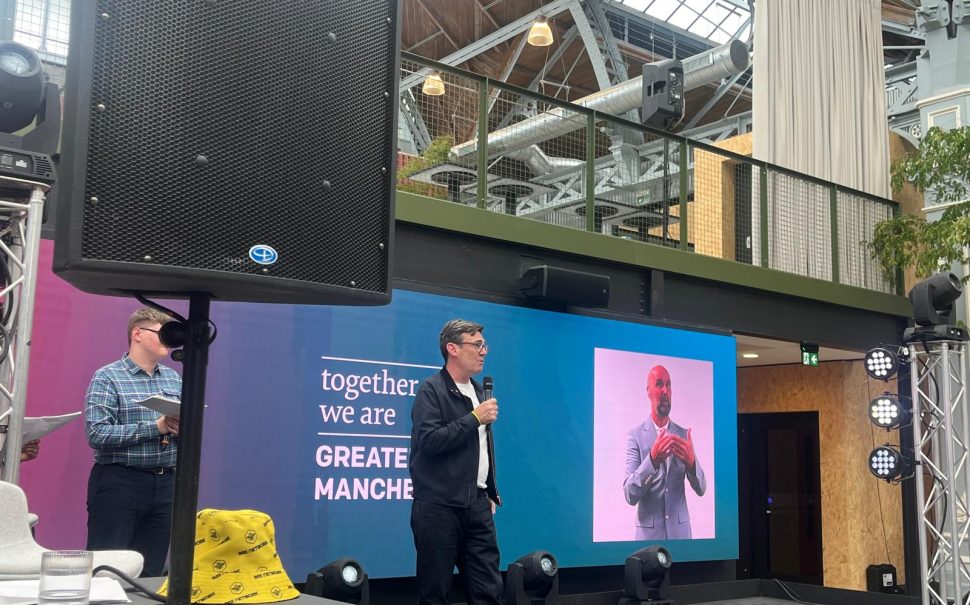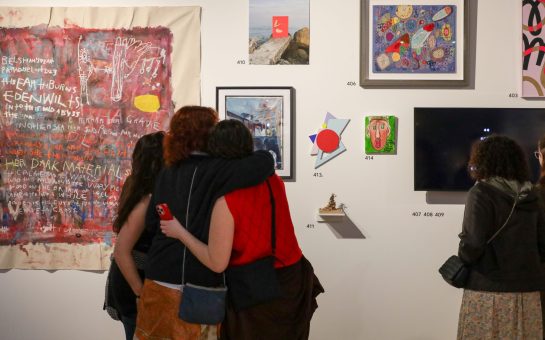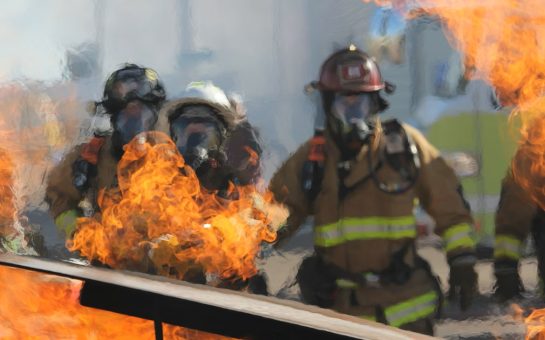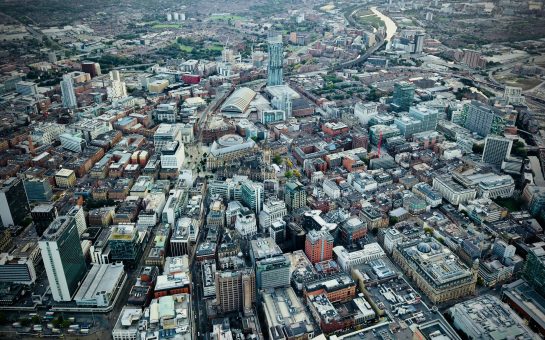Greater Manchester mayor Andy Burnham has revealed his bold vision for Manchester – vowing it will rival “any other second city on the planet” by 2050.
Underground rail, an Old Trafford revamp and a reimagining of welfare were among his ambitious goals unveiled at Manchester’s Campfield venue.
The wide-ranging Greater Manchester Strategy 2025–2035 outlined Burnham’s ambitions to overhaul the welfare system, with plans to transform housing, education and transport across the 10 boroughs.
And his longer-term plans for Manchester – the UK’s unofficial ‘second city’ after London – include an underground system centred around the city’s Piccadilly Station.
Burnham said: “Look at where we are today – the fastest growing city region in the country, closing the north-south divide.
I went along to the Greater Manchester Strategy 2025-2035 launch at Campfields to listen to Andy Burnham's vision for the future – with plans confirmed for underground rail by 2050! pic.twitter.com/TNvQN3Q37B
— Georgie Docker (@DockerGeorgie_) July 11, 2025
“That’s the superpower of Greater Manchester – that it’s we, not me – that we do it together.
“And we have built this together. From 2025 to 2035 I want to double down on that – to get even closer in the way we work.
“All of today’s ambitions are achievable if we work together, as one unified Greater Manchester.”
At the core of the strategy are radical transport infrastructure projects, which include a pledge to begin work on a Metrolink extension to Stockport by 2030 and the creation of an underground station at Manchester Piccadilly, which Burnham termed “the King’s Cross of the North but better”.
Burnham said: “Manchester, we are going underground.
“I’m going to ask Transport for Greater Manchester to start working on options for underground services.
“And we are going to start exploring with the government how we might finance a modern layered transport system you would expect in any second city of our stature.”
Visions of Manchester “going underground” are by no means new – the 1970s saw plans of Picc-Vic’ subterranean tunnel that were subsequently abandoned.
And far more recently Transport for Greater Manchester (TfGM) named it as a priority last year.
But Wednesday’s launch was the first confirmation of concrete plans to see the network in place by 2050 – set to begin with a new underground Piccadilly Station, already in the pipeline as part of the new Liverpool-Manchester line.
Does Manchester need an underground?
— Georgie Docker (@DockerGeorgie_) July 11, 2025
Additional transport pledges included a tram-train route set to connect Bury, Heywood, Rochdale and Oldham, and night buses to begin operating in Bury and Rochdale.
And young people will benefit from half-price bus travel for 18 to 21-year-olds from September, while a pilot scheme offering free 24-hour bus travel for older and disabled residents will be introduced in August.
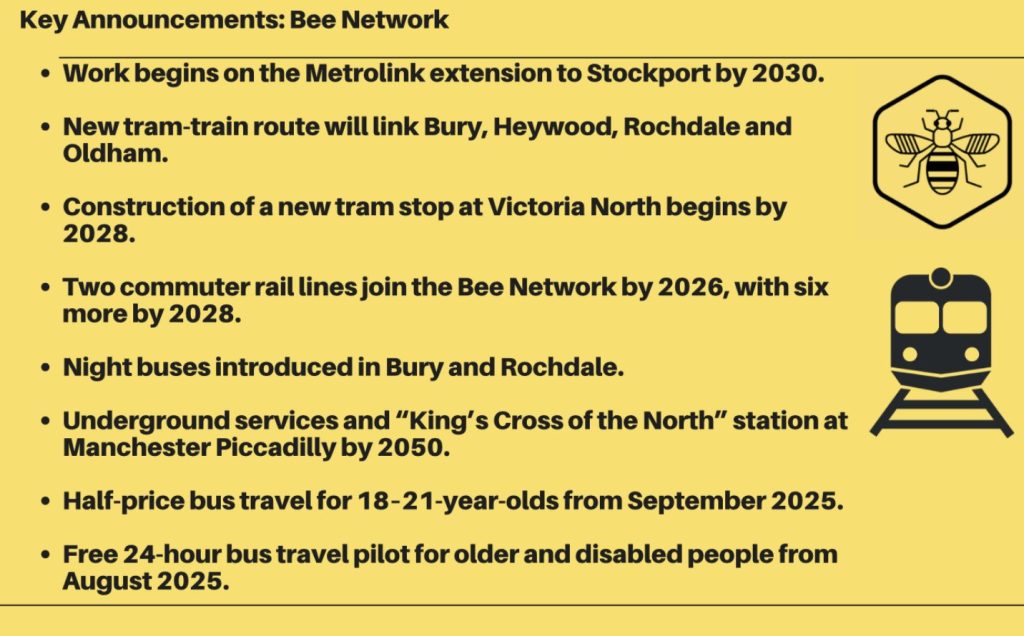
Speaking specifically about Greater Manchester’s youth, Burnham argued that benefits of growth must be felt beyond the city centre.
He said: “Young people who can see the city skyline from their bedroom windows should not be prevented from opportunities here based on access to transport.”
Beyond infrastructure, technical education reform included the Greater Manchester Baccalaureate – and guaranteed 45-day work placements for young people.
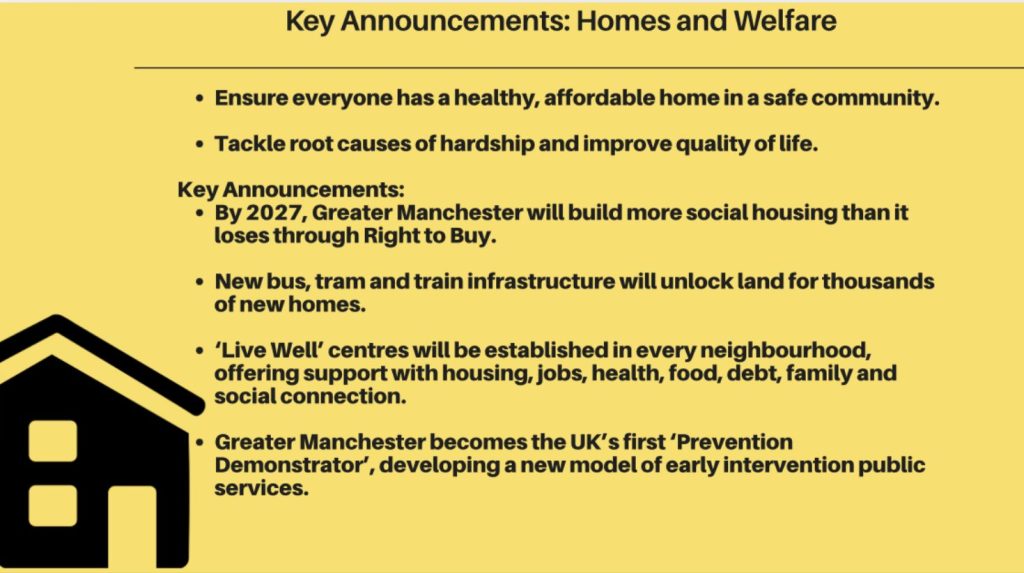
Social reform was a central aspect of the strategy – with promises to ensure that thousands of new houses will be built and social housing will be on the rise in Greater Manchester by the end of the decade.
Currently social housing is on decline, with more lost than developed, as a result of the Right to Buy scheme.
A cornerstone of the strategy’s plan was welfare reform to make Greater Manchester the UK’s first ‘Prevention Demonstrator’ – with Greater Manchester’s “Live Well” programme to be the backbone of community support.
Burnham called the current welfare system “distrustful”, and said the benefits system “knocks people down”, rather than empowering people through belief.
He said: “We know we will only change the fortunes of all our people and places if we’re prepared to intervene and fix the foundations of life.
“That means making sure everyone has a healthy home, in a safe and welcoming community.”
The strategy rejects “trickle-down” economics, instead focusing on direct intervention to fix the foundations of life for all residents.
Burnham said: “We’ve proved that we’re ready to forge our own place-based solutions and the Government has recognised this by making us the UK’s first ‘Prevention Demonstrator’.
“We’ll develop a better way of delivering public services, treating people as names not numbers and creating the conditions for everyone to live well, rather than waiting until people are in crisis to offer support.”
Another aspect of Greater Manchester’s blueprint for growth included the role of new Mayoral Development Corporations (MDCs).
MDCs are statutory bodies, set up by the Mayor, to speed up development and attract investment within a specific area – and are able to take on land acquisition, planning, and infrastructure functions.
In an eye-catching appointment from the evening comedian and actor Steve Coogan flashed on the big screen to announce his return to his hometown as co-chair designate of the Middleton development corporation.
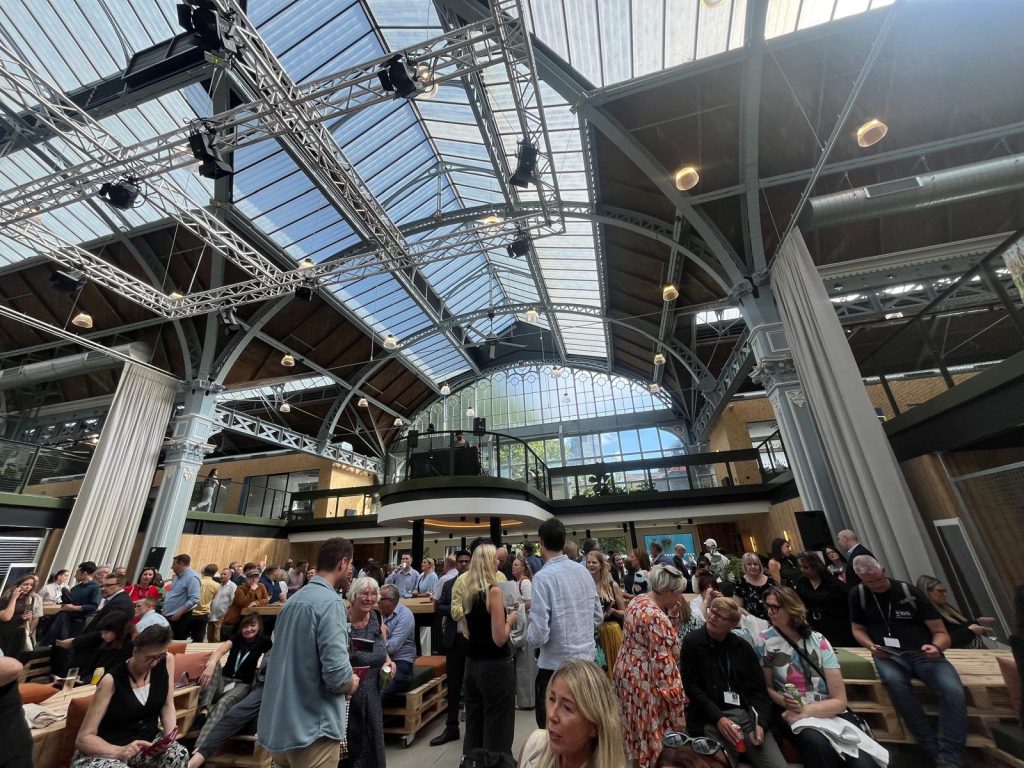
The comedian – best known for his on-screen persona Alan Partridge – will be working alongside Rose Marley, chief executive of Co-operatives UK.
Coogan said: “We are very excited about talking to the people of Middleton – finding out what they want, and building on the great history of Middleton – a great rich history, of people power.
“We want to harness that and kickstart a new chapter for the town.”
And Coogan wasn’t the only notable name of the evening.
The much-anticipated £4.2bn regeneration of Old Trafford will be led by Lord Sebastian Coe, who chaired London’s 2012 Olympics bid.
At the heart of the project will be Manchester United’s proposed new 100,000 seater stadium – already envisioned to be the “Wembley of the North”.
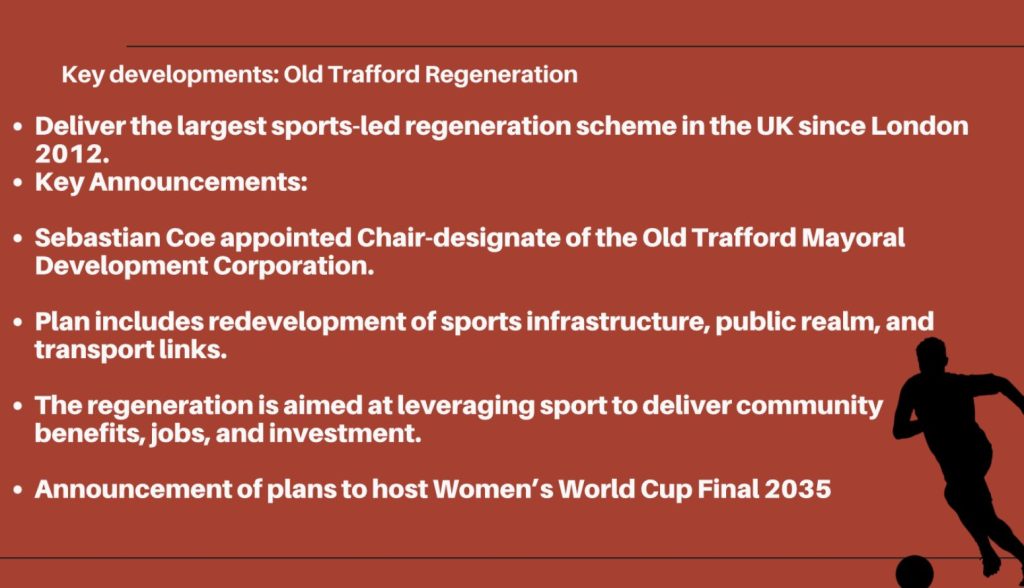
And the new venue was proposed by Burnham as possible venue for the 2035 FIFA Women’s World Cup final.
But Lord Coe anticipates the revamp will have wider-reaching impacts than sport alone.
Coe said: “Sports-led regeneration can foster strong communities and act as a catalyst for economic growth – that was certainly true of the London 2012 Olympics and Paralympics – and now, I believe, Greater Manchester’s moment has come.”
I’m delighted that I’ve been asked to be the chair designate of the proposed Old Trafford Mayoral Development Corporation.
— Seb Coe (@sebcoe) July 10, 2025
Throughout my career, I’ve seen the difference that sports-led regeneration can make in fostering strong communities and acting as a catalyst for economic… https://t.co/dEzFpwSv5D
If successful, the ten-year plan could bring untold growth across all boroughs – and the proposed welfare overhaul could be a model for a groundbreaking example of devolutionary powers in England the likes of which have never been seen.
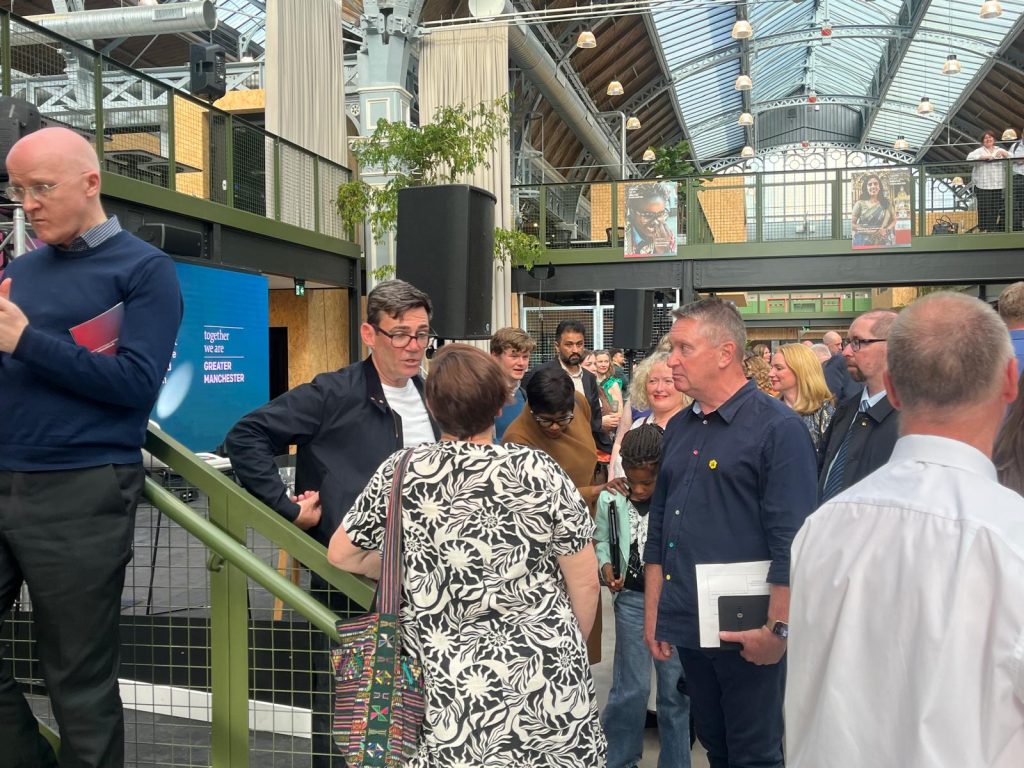
Burnham added: ”Our vision is ambitious, but in my eight years as mayor, I’ve learned that, when we pull together, there’s nothing we can’t achieve.
“There’s a long and proud tradition of collaboration in Greater Manchester.
“Devolution has turbocharged that and now we’re ready to deliver a new model of growth where no one is left behind.”
